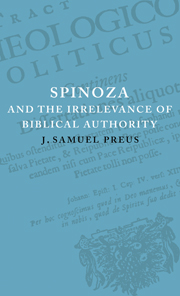Book contents
Concluding reflections
Published online by Cambridge University Press: 03 February 2010
Summary
THE CAUSE OF LIBERTY
Spinoza's Tractatus deserves major credit for the fact that our political system is governed by human laws and not answerable to any who would impose their version of divine law on the public. No one before or since has more thoroughly nullified the authority of God's would-be interpreters in the public realm by exposing as irrelevant the biblical platform from which they held forth. Spinoza accomplished this mainly by a radical historical analysis of scripture that severed the thought-world of the Bible from that of his own time, depriving the ecclesiastical authorities of their intimidating claim that the opinions of biblical authors were eternally valid, and that they, the duly constituted experts, were their interpreters.
In particular, Spinoza reexamined biblical history to undercut analogies by which the theocrats sought to legitimate their privileged status; in their place he (like Hobbes) constructed analogies of his own: ancient Israel for him was not a shining exemplar for the brave new world of the Dutch Republic so much as a pointed object lesson in the failure of theocracy and divided sovereignty. Revealing the connection between the theoretical and the social, Spinoza recognized that you could not sustain a democratic state with a hierarchical religious authority situated above the state any more than you could submit philosophy to the authority of theology without creating hopeless confusion and threatening liberty. He further recognized that the most effective arguments for his cause should be historical: his natural histories of scripture and religion replaced theological myths and deprived their authoritative interpreters of further employment.
- Type
- Chapter
- Information
- Spinoza and the Irrelevance of Biblical Authority , pp. 203 - 211Publisher: Cambridge University PressPrint publication year: 2001



